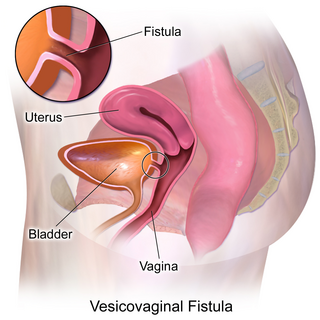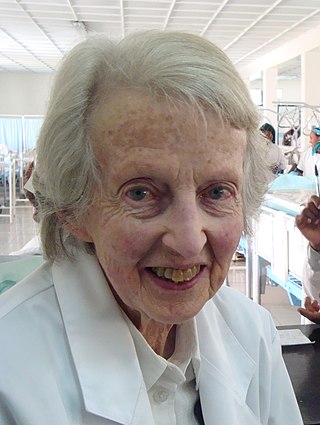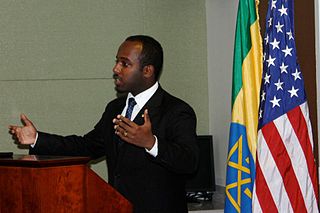Related Research Articles

Obstetric fistula is a medical condition in which a hole develops in the birth canal as a result of childbirth. This can be between the vagina and rectum, ureter, or bladder. It can result in incontinence of urine or feces. Complications may include depression, infertility, and social isolation.

James Marion Sims was an American physician in the field of surgery. His most famous work was the development of a surgical technique for the repair of vesicovaginal fistula, a severe complication of obstructed childbirth. He is also remembered for inventing Sims speculum, Sims sigmoid catheter, and the Sims position. Against significant opposition, he established, in New York, the first hospital specifically for women. He was forced out of the hospital he founded because he insisted on treating cancer patients; he played a small role in the creation of the nation's first cancer hospital, which opened after his death.

Vesicovaginal fistula (VVF) is a subtype of female urogenital fistula (UGF).

The Canadian Network for International Surgery (CNIS) is a non-profit organization that promotes the delivery of essential surgical care to underprivileged people in low-income countries. Its objective is also to reduce death and disability caused by any disturbances in normal functioning of the mind or the body that would require surgery. The CNIS emphasizes education in surgical work and techniques. It also works in surgical development and research.

Elinor Catherine Hamlin, AC, FRCS, FRANZCOG, FRCOG was an Australian obstetrician and gynaecologist who, with her husband, New Zealander Reginald Hamlin, co-founded the Addis Ababa Fistula Hospital, the world's only medical centre dedicated exclusively to providing free obstetric fistula repair surgery to poor women with childbirth injuries. They also co-founded an associated non-profit organisation, Hamlin Fistula Ethiopia.

Fistula Foundation is a nonprofit 501(c)(3) organization focused on treatment of obstetric fistula, funding more repair surgeries than any other organization, public or private. As of September 2022, they support hospitals and doctors in over 20 countries across Africa and Asia. The foundation is dedicated to treating obstetric fistula by covering the full cost of fistula repair surgery for poor women who would otherwise not be able to access treatment. They also provide fistula surgeon training, equipment and facility upgrades that make fistula treatment as safe as possible, post-surgery counseling and support for healed patients. The foundation has been recognized by several organizations for its transparency, effectiveness and efficiency, earning a top "A" rating from Charity Watch and a four star rating from Charity Navigator for 16 years in a row, placing it in the top 1% of charities reviewed on the site. In 2023, the foundation received a $15 million gift from philanthropist MacKenzie Scott, announced alongside a new five-year strategic plan that will advance the foundation's In It to End It vision. The foundation has also been selected as one of 22 charities recommended by Princeton Professor Peter Singer's organization, The Life You Can Save. The organization's cost-effectiveness was also noted by GiveWell in 2019.
Shershah Syed is a Pakistani physician and surgeon, known for his work in obstetrics and maternal health. He was involved in providing emergency medical assistance to victims of the 2010 Pakistan floods. He was the President of the Society of Obstetricians & Gynecologists of Pakistan from 2007 to 2010, He is the current President of the International Society of Fistula Surgeons (ISOFS) and also the Pakistan National Forum on Women's Health (PNFWH).

Addis Ababa Fistula Hospital, also known as AAFH and Hamlin Fistula Hospital, is a women's health care hospital based in Addis Ababa, Ethiopia. The hospital was founded by Australian physicians Catherine Hamlin and Reginald Hamlin, to care for women with childbirth injuries. It is the only hospital of its kind dedicated exclusively to treating women with obstetric fistula, a condition in the developing world where maternal health provisions are poor. All patients are treated free of charge.
The St. Paul's Hospital Millennium Medical College in Addis Ababa is the first largest hospital in Ethiopia.
Ethiopiaid is a UK-registered charity that generates public funding for local charity partners in Ethiopia. It supports organisations who work in poverty reduction, healthcare, empowerment of women & girls, elder support, children with disabilities, surgery for facial disfigurements and educational access.

Samuel Gebru is an Ethiopian American activist.
The following is a historical events of Addis Ababa, the capital of Ethiopia, including its formation prior to 20th century by chronology.
Women's health in Ethiopia can be broken down into several sections: general health status, women’s status, maternal health, HIV, harmful traditional practices, and violence against women.
Kate Grant is an American nonprofit leader and writer. She is the founding CEO of Fistula Foundation, a global nonprofit organization that provides surgical treatment for the childbirth injury obstetric fistula. She has led the organization from supporting one hospital in Ethiopia to being the clear global leader in obstetric fistula treatment. Fistula Foundation funds more fistula surgeries than any organization in the world; their goal is to eliminate the suffering caused by the injury, which untreated leaves women incontinent and too frequently social outcasts. An estimated one million women suffer from fistula worldwide, and due to a global shortage in awareness and funding, fewer than 20,000 are treated each year. Under Ms. Grant's leadership, Fistula Foundation has raised more than $84 million and supported treatment in 33 countries. Fistula Foundation is a recommended charity of ethicist Peter Singer's The Life You Can Save. In addition, it has earned 16 consecutive 4-star ratings from Charity Navigator, and an A rating from Charity Watch.
Terrewode Women's Community Hospital, is a community hospital, under construction in Uganda, that specializes in the prevention, treatment, surgical correction and rehabilitation of obstetric fistula and its complications.

Senait Fisseha is an Ethiopian endocrinologist at University of Michigan working with reproductive endocrinology and infertility and director of international programs at the Susan Buffet Foundation. Fisseha has a J.D. degree and is known for her work as an advocate for global reproductive health, rights and gender equality. She is the founder of the Center for International Reproductive Health Training (CIRHT) at the University of Michigan. She chaired the election campaign of Tedros Adhanom, the first African Director General of the World Health Organization, in 2016-17.

Sr. Dr. Maura Lynch was an Irish doctor, a nun, and proponent of women's health.
The Association for Rehabilitation and Re-Orientation of Women for Development, abbreviated as TERREWODE, is a leading Ugandan nonprofit organization. It pioneered best practices for the elimination of obstetric fistula in Uganda over 16 years. The organization focuses on maternal and reproductive health. Headquartered in Soroti, TERREWODE's efforts target the empowerment and education of young women in rural communities. TERREWODE's activism focuses on women's rights to maternal, reproductive and sexual health, as well as the treatment and social reintegration of victims of obstetric fistula.
Sayeba Akhter is a Bangladeshi physician who has dedicated her career to eliminating obstetric fistula. She is an executive member of the International Society of Obstetric Fistula Surgeons and has previously served as the president of the Obstetrics and Gynaecology Society of Bangladesh. She leads two charities, in Dhaka and Gaibandha, which focus on the education of underprivileged girls.
Barbara E Kwast (1938) is an epidemiologist, midwife and educator. Her research on the cause of maternal deaths has, according to the UNFPA, contributed to reducing the maternal mortality rates in the world.
References
- 1 2 "Mamitu: One of BBC's 100 Women in 2018". hamlin.org.au. Catherine Hamlin Fistula Foundation. 30 January 2019. Archived from the original on 12 July 2019.
- ↑ "BBC 100 Women 2018: Who is on the list?". 19 November 2018. Archived from the original on 20 November 2018. Retrieved 9 July 2019.
- ↑ "I trained to be a surgeon when I couldn't read or write". BBC. Archived from the original on 8 July 2019. Retrieved 8 July 2019.
- ↑ Wall, L. Lewis (2018). Tears for My Sisters: The Tragedy of Obstetric Fistula. Johns Hopkins University Press. ISBN 978-1421424187.
- ↑ "Making a Contribution to the Fistula Hospital for Over 50 Years [opinion]". allafrica.com. 23 August 2014 – via NewsBank. Retrieved 12 July 2019.
- ↑ Kristof, Nicholas (12 June 2005). "The Illiterate Surgeon". The New York Times. Archived from the original on 8 July 2019. Retrieved 8 July 2019.
- ↑ Barrowclough, Nikki (10 October 2014). "Catherine Hamlin: Ethiopia's miracle worker". The Sydney Morning Herald. Archived from the original on 8 July 2019. Retrieved 8 July 2019.
- ↑ Henry, J. A. (January 2015). "Essential Surgery: The Way Forward" (PDF). World Journal of Surgery. 39 (4): 822–832. doi:10.1007/s00268-014-2937-9. PMID 25566979. S2CID 24559192.
- ↑ Hancock, Brian (2005). First Steps in Vesico-Vaginal Fistula Repair (PDF). The Royal Society of Medicine Press Ltd. p. 58. ISBN 1-85315-611-6. Archived (PDF) from the original on 11 March 2013. Retrieved 10 July 2019.
- ↑ "Obituary: Reginald Hamlin". The Times . 14 August 1993. Retrieved 12 July 2019.
- ↑ Kristof, Nicholas; WuDunn, Sheryl (2010). Half The Sky: How to Change the World. Hachette UK. ISBN 978-0748117758.
- ↑ Ribeiro, Bernard (2007). "Africa Revisited". The Bulletin of the Royal College of Surgeons of England. 89 (2): 46–48. doi:10.1308/147363507X173959.